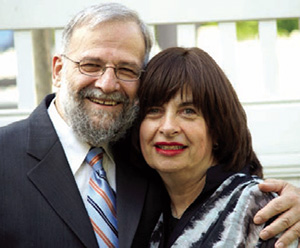
In the past two weeks, we have unfortunately had the occasion of visiting two different houses of shiva. In both cases, the families of the people who had died were people whom we knew prior to our move to the States. Rarely can it be said that when a person passes away it is not sad. No matter what the age might be of the person who passed, for the family in particular, their loss is difficult and painful. Nevertheless, we all have heard and have been guilty of thinking that if a person is well on in years and dies it is certainly not as devastating as it would be for a family that loses a young person.
The halacha of not approaching the person sitting shiva with conversation until he begins to talk with you is on the one hand helpful, and on the other hand it can be extremely uncomfortable. We have sat in a room with a family whose young husband and father suddenly collapsed on the sidewalk and died. There was not a peep in the room for the entire 30 minutes that we sat there. Then again, we have attended shiva homes where the atmosphere and conversation was lively, even amongst the mourners themselves. They were coping in the way that they felt most comfortable.
The first shiva house that we visited was to show our support to friends from Montreal. Their dear son, close to 50, had passed away. His wife and children sat huddled together—some of his children married and with them their brother of 18. Our friend shared with us how much she was learning about her son, the chesed that he did, the reputation that he had, the closeness in his relationship with his children and his wife and the kavod that he bestowed upon his in-laws. With tears pouring down her face and a look of painful sorrow, she shared, “Nina, this is the third time that I am burying a child. Is this the way that life is supposed to be?”
Nothing could be done or could be said except to hold her closely. Our friends have three children with a rare genetic disorder. Two of them had already passed away. What is probably the most crazy occurrence in their lives is that their son Lipa was their one “normal” son. He brought them nachas and much love. How could Hakadosh Baruch Hu allow such a thing to happen?
Before we could actually discuss the agony of this loss, our friend comforted us by telling us that as a difficult as it is to imagine, she was gaining strength from the fact that she is sure Hashem had a plan and that He has made a crown of jewels, with each one of her children representing a jewel. We then discussed that in cases such as this there is no way that mankind can understand what this could mean. How is it possible for one family to live through these nightmares? The emunah that we shared with each other gave her solace temporarily until her heart would begin to break once again and she would have to remind herself of the path of Hashem. We are not sure where one gets the strength to move on. Being in touch with her after their return to Montreal, she told us of the comfort derived from their “own” community. The caring and love being shown to them was humbling. This is a characteristic that we, living in a frum community, should feel proud of.
The second family that we visited in the past week had lost their husband and father. He was a well-respected and beloved rebbe in a yeshiva in Far Rockaway. He will not be there to attend the weddings of his two unmarried children. His wife spoke of how they really believed that he was going to fight the disease that had taken over his body. On the morning that he was rushed to the hospital she called her children and said that they would probably be home together in the afternoon. Never did she expect him to die that day. We specifically asked her if he realized that morning on his way to the hospital that he would not be returning home and she replied, “Absolutely not.” They both thought that this was just another bump in the road. His talmidim spoke of his devotion to his students. One young man mentioned to the family that their husband and father was responsible for encouraging him to be the person that he is today. People would speak and interact with those sitting shiva and then there would be a pause—an uncomfortable silence. It was as though suddenly the realization came to them of the fact that the beloved who they were talking about would no longer be giving his shiur, would no longer interact with his little grandson, would no longer be a part of his son or daughter’s shidduch process, would no longer be nearby to share a quiet moment with his beloved wife. The enormity of the situation took hold and an uncomfortable moment ensued. Again, a family with passionate emunah will move forward slowly at first with the knowledge that we are not capable of understanding the plans of Hashem.
We are firm believers in always giving thanks for every little thing that we have. We take advantage of each moment of our lives to remind each other of our good fortune. Celebrating Thanksgiving, a totally secular occasion, gives us one more opportunity to be together and remind each other of the gift that we have been given as a family. With the many tragedies that families are facing, we laud the opportunity to celebrate gratefulness for each other and for the freedom that is extended to us in the land in which we live.










